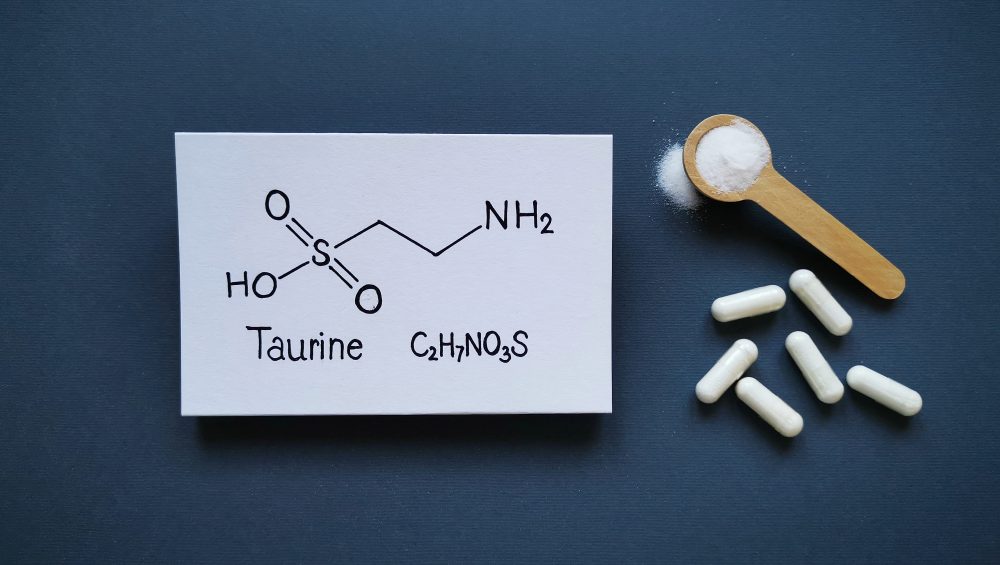Did you know that taurine is found in energy drinks? This amino acid is often used as a supplement to improve athletic performance and cognitive function. But what exactly is taurine, and what are the benefits of taking it?
In this article, we will explore everything you need to know about taurine. We will talk about what it is, how much you need per day, the potential dangers of too much taurine, the side effects associated with taurine supplements, and how to choose a high-quality supplement. We will also discuss the top ten health benefits of taking taurine.

What Taurine Is
Taurine is an amino acid that is made up of sulfur and carbon. It is found in the body, particularly in the muscles, heart, and brain. Taurine is also found in some foods, including meat, fish, and dairy products.
Taurine has many benefits for the body. It can improve athletic performance by increasing endurance and reducing fatigue. It can also improve cognitive function and memory. Taurine can also help protect the heart from damage caused by a heart attack; additionally, taurine can help regulate blood sugar levels and improve insulin sensitivity. Taurine supplements may also help reduce anxiety and symptoms of depression.

How Much Taurine You Need Per Day
Taurine is an amino acid that plays a vital role in immune function, digestive health, and neurological development. The recommended daily intake for adults is about 500-2000 milligrams per day. However, it is paramount to note that this recommendation can vary depending on age, health status, and lifestyle factors. For example, pregnant women may require higher levels of taurine for fetal development.
Consult a healthcare professional for personalized recommendations on optimal taurine intake; additionally, the best way to ensure sufficient taurine intake is through diet. Foods high in taurine include seafood (such as shrimp, scallops, and tuna), poultry, dairy products, and certain plant-based sources, like seaweed and green tea. Supplementation may also be necessary for individuals following a restrictive or vegetarian or vegan diet. As always, it is critical to speak with your doctor before starting any new supplement routine. With the right dietary choices and guidance from a healthcare professional, you can easily maintain healthy levels of taurine in your diet.

Possible Dangers Of Too Much Taurine
Taurine is naturally found in the body and certain foods and is often added to energy drinks for its supposed performance-enhancing effects. However, consuming too much taurine can have serious adverse effects on the body. High doses of taurine have been linked to liver damage, cardiovascular issues, and even vision changes.
In addition, high levels of taurine can interfere with medications and disrupt thyroid function. Because of these potential dangers, it’s vital to limit taurine intake to recommended levels and consult a healthcare professional before taking taurine supplements. The benefits of consuming taurine should be weighed against the potential risks – ultimately, moderation is key when it comes to this important amino acid.

Taurine Supplement’s Side Effects
When taken in moderation, taurine supplements can offer a range of benefits, including improved exercise performance and heart health. However, as with any supplement, there are also potential side effects to consider. Some common side effects include headaches, nausea, and digestive issues, like diarrhea and abdominal pain.
Taurine may also interact with certain medications, such as blood thinners and diabetes medications, so it’s vital to consult a healthcare provider before taking a taurine supplement. In rare cases, taurine overdose has been reported to cause seizures and liver damage. Taking more than the recommended dose is not likely to offer additional benefits and can increase your risk of experiencing these adverse effects. Overall, taurine supplements can be beneficial when taken in moderation under the guidance of a healthcare professional. It’s always paramount that you do your research and proceed with caution when starting any new supplement regimen.

How To Choose A High-Quality Supplement
When choosing a taurine supplement, it is essential to consider the source of the taurine. Taurine derived from animals may not be suitable for vegetarians or those with allergies, so finding a plant-based taurine source, such as algae, can be helpful. It is also critical to pay attention to the manufacturing process and the company’s reputation. Look for supplements that use third-party testing and follow good manufacturing processes.
Another consideration is the form of the supplement. Taurine is often sold in powdered or capsule form, so choose what best suits your needs and preferences. Lastly, consult a healthcare professional before starting any new supplement regimen to ensure that it will not interact with any medications or current health conditions. With these tips in mind, you can confidently choose a high-quality taurine supplement.

Top 10 Health Benefits Of Taking Taurine
Taurine is an amino acid that is made up of sulfur and carbon. It is found in the body, particularly in the muscles, heart, and brain. Taurine is also found in some foods, including meat, fish, and dairy products.

1Improves Athletic Performance
Taurine is a naturally-occurring amino acid. It has long been used in the athletic community to enhance physical performance. Research has shown that taurine can increase endurance and muscle contractibility, leading to improved exercise capacity.
It also improves muscular coordination and delays the onset of muscle fatigue, allowing athletes to train for longer periods. Taurine has also been found to reduce inflammation and improve recovery after exercise, making it a valuable supplement for any athlete looking to optimize their training and performance. However, it is essential to note that taurine should not be used as a replacement for healthy eating habits and a balanced workout regimen. Rather, it can serve as an additional tool to support one’s athletic goals and improve overall physical performance.

2Improves Cognitive Function
Taurine, a naturally occurring amino acid, has been shown to have numerous benefits for cognitive function. In one study, taurine supplementation improved attention, memory, and reaction time in adults with mild cognitive impairment. Taurine also may improve symptoms of depression and anxiety through its influence on the neurotransmitters, such as dopamine and serotonin.
In addition to its positive effects on mood, taurine has been found to protect against oxidative stress in the brain and may even have neuroprotective properties that can slow the progression of neurodegenerative diseases, like Alzheimer’s disease. Taurine can be found in food sources like meat and seafood, but for those looking to increase their intake, taurine supplements are also available. Overall, taurine is a powerhouse for brain health and can be easily incorporated into one’s diet for enhanced cognitive function.

3Helps Protect The Heart
Taurine is an amino acid that is found in high concentrations in the heart, brain, and muscles. It plays a crucial role in regulating electrolyte balance and calcium uptake, which can have positive effects on heart health. Research has shown that taurine can help improve cardiovascular function and protect against cardiovascular disease by lowering blood pressure and reducing oxidative stress.
It may also support exercise performance by improving muscle function and endurance. Taurine can be found naturally in meat and seafood, but it is also commonly added to energy drinks and supplements. Overall, taurine has significant benefits for heart health and should be incorporated into a balanced diet or supplement regimen.

4Regulates Blood Sugar Levels
Taurine, often referred to as an “invisible amino acid,” plays a significant role in regulating blood sugar levels and insulin sensitivity. Research has shown that taurine deficiency can lead to an increased risk of Type 2 diabetes. Supplementing with taurine has been found to improve glycemic control and decrease fasting glucose levels in individuals with diabetes.
Taurine also helps improve tolerance to glucose and increases the body’s ability to use glucose for energy. In addition to its effects on blood sugar regulation, taurine has numerous other health benefits, including improved heart health, brain function, and exercise performance. It can be found naturally in meat, fish, and dairy products or taken as a supplement. Overall, taurine plays a critical role in maintaining balanced blood sugar levels and overall health.

5Reduces Anxiety And Depression Symptoms
There have been multiple studies on taurine’s impact on mental health, with results showing that taurine can effectively reduce anxiety and symptoms of depression. It helps regulate neurotransmitters in the brain, including dopamine, serotonin, and GABA. All of these greatly influence mood and emotion.
Taurine has also been shown to improve cognitive function, especially in those with major depressive disorder or bipolar disorder. However, it is important to note that taurine is not a replacement for prescribed medication and should always be used under the guidance of a healthcare professional. Overall, taurine may offer promising benefits for mental wellness but should be used as part of a comprehensive treatment plan.

6Improves Brain Health
Amino acids are the building blocks of protein, and taurine is one of the most abundant amino acids in the human body. It can be found in high concentrations in our brains, muscles, and heart. Research has shown that taurine plays a significant role in brain health, including improving cognitive function and reducing the risk of age-related neurological decline.
It improves communication between brain cells, increases neuronal development, and protects against oxidative stress. Taurine may also have a positive effect on mood and anxiety levels. The best dietary sources of taurine include meat and seafood, but it can also be taken as a supplement. Overall, incorporating taurine into your diet or supplement routine can have notable benefits for your brain health.

7Reduces The Risk Of Diabetes
Many studies have shown that taurine, a naturally occurring amino acid, can help prevent and manage diabetes. In people with diabetes, taurine has been found to improve insulin sensitivity and reduce fasting blood glucose levels. Taurine has also been shown to have protective effects on the pancreas, preventing cell damage and promoting healthy pancreatic function. One study even found that taurine supplementation improved the effectiveness of diabetes medication in rats.
However, it is paramount to note that while taurine may be beneficial for those with diabetes, it should not be used as a replacement for proper medical treatment and blood sugar monitoring. As always, it is necessary to consult with a healthcare professional before starting any new supplementation routine. Overall, research suggests that taurine may play a role in reducing the risk of diabetes and managing its symptoms.

8Boosts Immune System
Taurine is a sulfur-containing amino acid that plays a significant role in many bodily functions. It helps regulate fluid balance and electrolyte levels and aids with the absorption of fat-soluble vitamins. It also supports proper brain and eye development.
Taurine also boosts the immune system by promoting the activity of white blood cells, helping your body fight off infections and diseases. This essential nutrient can be found naturally in meats, fish, and dairy products but is also available as a dietary supplement for those who may not get enough through their diet alone. So the next time you’re considering taking an immune booster, don’t forget about taurine’s powerful impact on your body’s defense mechanisms.

9It Prevents Osteoporosis
Taurine, an amino acid found naturally in meat and fish, has been found to have a strong impact on bone health. In a study of post-menopausal women, supplementing with taurine led to increases in bone mineral density and reductions in markers for osteoporosis. Taurine works by increasing the activity of osteoblasts, the cells responsible for building new bone tissue.
It also helps regulate calcium levels, another important aspect of maintaining strong bones. Those at risk of osteoporosis, such as older adults or those with low calcium intake, may benefit from including taurine in their diets. While taurine can be obtained through diet, it can also be taken in supplement form for added benefits. Overall, taurine plays a crucial role in preventing and treating osteoporosis.

10Reduces The Risk Of Cancer
Along with its well-known function in energy drinks, taurine plays a crucial role in human health. An essential amino acid found primarily in the muscles and brain, taurine helps regulate water levels and mineral concentrations in cells as well as aids with nerve transmission and vision. In addition to these important functions, research has shown that taurine may also have potential benefits for cancer prevention.
Taurine can stimulate immune responses and act as an antioxidant, protecting the cells from damage caused by free radicals that can lead to cancerous cell growth. One study even found that supplementing with taurine helped reduce the growth of prostate cancer cells in mice. While more research is needed on its effects on cancer specifically, incorporating taurine-rich foods, like seafood and meat, into your diet can support overall health and potentially reduce your risk of cancer.

Taurine supplements can offer a wide range of health benefits. Are you looking for a way to improve your overall health? If you are, taurine may be a good option for you.











